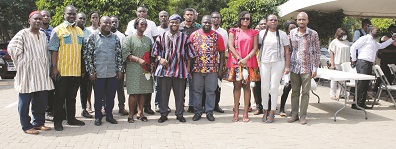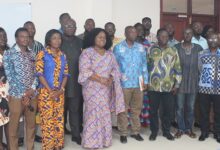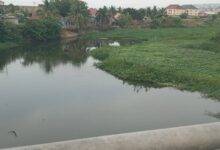
The Ghana Association of Agricultural Economists (GAAE), Southern Zone (SZ), has held its dialogue series on “E-waste and its Impact on the Environment and Livelihoods in Ghana” in Accra.
The dialogue series was to educate and raise awareness on the management and good use of Electronic-waste (E-waste).
E-waste means Waste Electrical and Electronic Equipment (WEEE), including discarded electronic equipment powered by electricity/battery/solar power; which is no longer suitable for use by the owner, and which is intended for dismantling and recovery of spare parts or is destined for material recovery and recycling or final disposal.
Speaking on the theme, Dr Vincent Nartey Kyere, E-waste expert, Ministry of Environment, Science, Technology and Innovation (MESTI), E-waste Project Implementation Unit (PIU), noted that E-waste management in Ghana was handled by formal (3%) and informal recyclers (97%).
He noted that some E-waste hotspots in the country included the Greater Accra, Northern, Ashanti and Eastern regions, saying that “these wastes we are talking about contain some value and some hazards.”
“Increased quantities of E-waste in Ghana have created an avenue for individuals to make a living by utilising unconventional recycling methods to recover valuable fractions.
There are also the release of pollutants, soil contamination, air pollution, which affect human health and rare earth metals,” he added.
Dr Kyere stressed that these wastes were not only a source of environmental contamination, but may also pose significant human health risks if improperly managed.
It was for this reason, he said, the MESTI E-waste project was aimed at minimising negative environmental and human health impacts from improper management of electronic wastes, as well as transiting the most polluting e-waste recovery activities from the informal sector to the formal sector without removing jobs from the lowest income group.
“Test a financial/pricing mechanism and support the National System with lessons learned,” he added.
The E-waste expert of the MESTI E-waste Project Implementation Unit said the country was “making strides in its e-waste management and is resolved to tackle remaining challenges in the sector to provide needed learning curves for other countries to emulate.”
He, therefore, recommended remediation assessment (Approach and Cost implication), bio-monitoring and other emerging e-waste sites.
Dr Sampson Atiemo, Executive Chairman, Mountain Research Institute (MRI), said we all had a role to play in the pollution of the environment and its attendant impact on the environment.
Hence, he said it was imperative for all and sundry to serve as watchdogs on each other in order to ensure that the environment was protected and E-waste used properly.
Likewise, Mr Felix Mote, Environmental Protection Agency (EPA), reiterated that environmental protection was a collective responsibility which would subsequently lead to a brighter protection.
Adding that the EPA would lead in ensuring that this was so with the backing of the entire populace.
BY ABIGAIL ARTHUR







